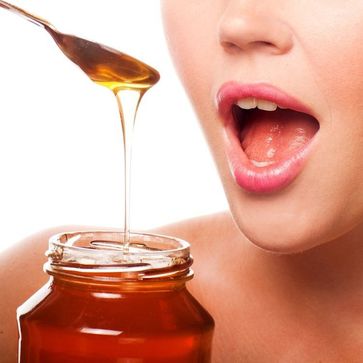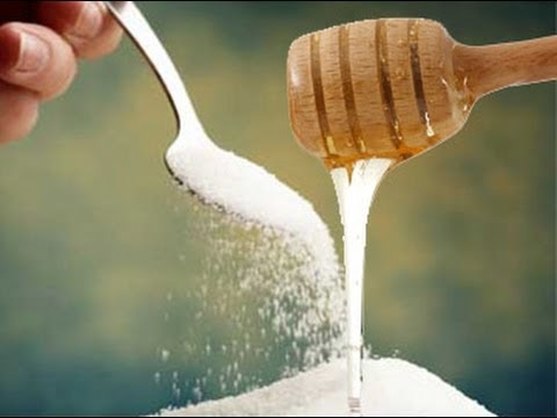|
Diabetes is a disease that impairs blood glucose levels in the human body and diabetics are always advised against eating sugary foods and drinks as these might increase blood sugar levels. Blood sugar levels are nothing, but the amount of sugar found in the blood. Sugar supplies our body with energy for performing our daily activities and insulin is secreted from the pancreas to maintain sugar levels in the body. In diabetics, this insulin production does not happen and this hinders regulation of blood sugar levels. We get sugar-free sweets, beverages and biscuits nowadays that claim to be diabetic-friendly and one question that arises in our minds is whether honey would be the best replacement for sugary sweets and snacks. Honey: The Flower Nectar Honey is basically flower nectar collected from flowering plants and stored inside the honeycomb as simple sugars. Differences exist in honey depending on the flowering plan these bees visit and also based on the location of these plants. Honey is the combination of glucose and fructose (almost 82% by weight) with varying quantities of vitamins, minerals and antioxidants present in it. Sweeter than sugar, honey has higher carbohydrate presence. One tablespoon of honey contains at least 17g of carbs. Honey Vs Sugar Any form of sugar-natural, processed or artificial sweeteners- is bad for diabetes in general. Raw honey too just like white sugar is made of carbohydrates and calories. If you compare, one tablespoon of honey contains approximately 64 calories while sugar contains only 49 calories. That’s because honey is much more denser and heavier than sugar and simply using 1 teaspoon of honey in the place of 1 tablespoon of sugar serves the purpose. Honey contains enzymes within itself that aid in digestion by the human body whereas sugar requires enzymes from within the body to break it down and digest it. It is a general rule that foods with low GI values can cause smaller increases in blood sugar levels. If you take this into account, honey has a GI of 55 (comes under low-GI category) and sugar has a GI of 65 which convey that honey does shows a reduced risk for type 2 diabetes. Numerous studies have tried comparing the benefits of using honey over sugar in the case of people with diabetes. A small study carried out in Dubai showed that individuals who took honey had lower blood sugar levels compared to those who consumed white sugar. Another study found that individuals who consumed honey for longer periods experienced increased blood sugar levels. The same study also found that individuals with type 2 diabetes who consumed honey lost weight and experienced reduced cholesterol levels in their blood. This made the researchers get one fact cleared-it is sensible for individuals with type 2 diabetes to consume honey, but sensibly. Another study published in the Journal of Diabetes and Metabolic Disorders reported that combining diabetes medications with honey is advantageous to the individual as honey is said possess the ability to reduce blood sugar levels, increase insulin levels and is a great antioxidant.  Honey, I'm Natural! Honey, I'm Natural! A Diabetic’s Diet Although honey might contain more carbs and calories in comparison to white sugar, it is more natural, contains nutrients and is said to only slightly impact blood glucose levels. There is no advantage of consuming honey over sugar in a diabetes eating plan as both affect blood sugar levels. If a person with type 2 diabetes would like to add honey to his/her daily diet, he/she must introduce it slowly consuming very limited quantities at a time to test its effects on blood sugar levels. A healthy diet with physical exercise can help bring down blood glucose levels. If you would like to get a diabetes-friendly diet for your body type, please get in touch with our nutritionists/dietitians at www.firsteatright.com. Hence, for people with diabetes adding small quantities of honey in their diet is not going to drastically impair their blood glucose levels and increase it gravely. Go ahead and consume honey instead of sugar in moderation as a part of a healthy diet plan. Comments are closed.
|
AVOID FRAUD. EAT SMART.+91 7846 800 800
AuthorDietitian & Nutritionist Dr. Nafeesa Imteyaz. Archives
July 2024
Categories
All
Dr. Nafeesa's Blog @blogspot |
- Home
- Written Testimonials
- Consult
- Clinics
- Blogs
-
Diet & Nutrition
- Diabetes Reversal
- IVF IUI not needed for PCOS PCOD Infertility
-
Medical Nutrition
>
-
Disease & Conditions
>
- Infertility | PCOS
- Diabetes Mellitus
- Cholesterol
- Hypothyroid
- Kidney Problems
- Hypertension
- Cardiovascular Diseases
- Liver Diseases
- Gastro intestinal disorder
- Cancer
- Metabolic Disorders
- Orthopedic Disorders
- Eating Disorders
- Dietary Recall
- Weight Record Filled By Clients
- Online Payment Transaction Details
- Online Clients Weight Check Form
- Our Program Package Service Charges
- Weight Record 2017 Clients
- Measurements sent by Clients
- Terms & Conditions Of Payment
- Thanks. Your Form is Submitted
- Video Testimonials
- Lifestyle & Wellness
- Lifestyle & Wellness Blog
- Allergy & Intolerance
- Weight Loss / Gain
- Weight Loss / Slimming Blog
-
Disease & Conditions
>
- Life Cycle Nutrition >
- Sports Nutrition >
- Integrity in Nutrition
- Knowledge Centre
© COPYRIGHT 2022. ALL RIGHTS RESERVED. FRST HEALTHCARE PVT LTD.
Dr. Nafeesa Imteyaz of First Eat Right clinic, is the Best Dietitian Nutritionist in Bangalore. Best Dietitian Nutritionist in Pune. Best Dietitian Nutritionist in Hyderabad. Best Dietitian Nutritionist in Chennai. Best Dietitian Nutritionist in Mumbai. Best Dietitian Nutritionist in Delhi. Best Dietitian Nutritionist in Kolkata.


